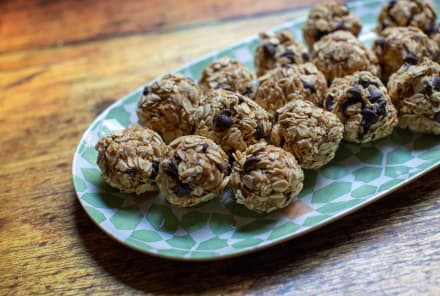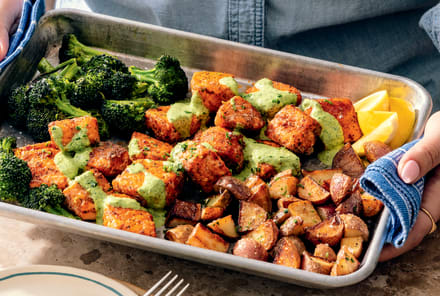Advertisement
I'm A Gastroenterologist & These Are My 6 Favorite Sources Of Polyphenols


If there's one class of phytonutrients gastroenterologist Emeran Mayer, M.D., says is crucial for gut health, it's polyphenols. Now, you may regard polyphenols as supercharged antioxidants—they are, but they're also so much more.
See, plants produce polyphenols when they're injured or under stress, Mayer explains on this episode of the mindbodygreen podcast—like exposure to pests, drought, or UV light. Those stress signals shimmy down into the plant's root system, which excretes a sugarlike molecule that attracts microbes into the roots. "These microbes then stimulate the plant roots to produce polyphenols, which is the medicine of the plant," he continues.
Here comes the fun part: When you eat those stressed-out, polyphenol-rich plants, these unique phytonutrients and other plant compounds (e.g., fiber) interact with our gut microbes to help produce good-for-you molecules.* "We ingest [the plants], and then our own microbes break [them] down. It's almost like a sealed package," says Mayer. "They break it down once it gets down to the large intestine and open up the package with all the goodies that are in there."*
Still with us? Below, find Mayer's menu of polyphenol-rich foods:
Berries
"You can't go wrong with any of the berries," says Mayer. Blueberries receive a ton of fanfare—as they contain a specific class of polyphenols, called proanthocyanidins1, that are superb for brain health—but Mayer praises golden berries and blackberries as well. Specifically, blackberries contain anthocyanins2 (another group of polyphenols), and the polyphenols in golden berries have been shown to have anti-inflammatory, immune-supporting properties3.
Cacao
Add Mayer to the growing list of experts who love raw cacao: "Cacao powder has a very high concentration of flavonoids, one category of polyphenols," he notes. These flavonoids can trigger the expression of brain-derived neurotrophic factor (BDNF), which is a protein that helps grow new brain cells. That's why experts say eating chocolate (raw, organic cacao, that is) can help promote cognitive function as you age4.
Extra-virgin olive oil
It turns out, extra-virgin olive oil is brimming with healthy fats and polyphenols—specifically, polyphenol hydroxytyrosol (HT)5, which experts say is one of the reasons a Mediterranean diet is so healthy.
And according to Mayer, you don't need to chug tons of olive oil to reap the benefits: "You want to take a very small cup of it," he notes. Or, you know, drizzle it on top of a salad.
Red wine
Cue the applause: Mayer is a fan of red wine (consumed in moderation, of course). It's chock-full of polyphenols, the most notable being resveratrol—which research shows can help promote longevity by modifying oxidative damage, inflammatory processes, telomere length, and cell death6 (plus a treasure trove of benefits you can find here).
In terms of how much red wine to drink, Mayer recommends no more than a half-glass or glass per night. "You don't want to go over that," he says. And if you'd like to skip the alcohol altogether, you can also find resveratrol in grapes, blueberries, raspberries, mulberries, and even peanuts.
Chia seeds
While Mayer lauds the whole category of seeds, he mentions a few superstars, in particular—one of them being chia seeds. In fact, one study found that chia seeds were a richer source of polyphenols than flaxseeds by about 42% (nothing against flax; that's a great option, too!). They specifically include daidzein (a type of isoflavone) and rosmarinic acid7, which has well-documented antioxidant properties8.
Walnuts
Walnuts are commonly praised for their fiber and healthy fats, but Mayer says don't sleep on their polyphenol content: These nuts contain ellagitannins9, a class of bioactive polyphenols with promising antioxidant and anti-inflammatory benefits. One study even found that walnuts had the highest polyphenol content of all the nuts (compared to Brazil nuts, pistachios, pecans, peanuts, almonds, macadamias, cashews, and hazelnuts).
The takeaway.
Mayer calls polyphenols the "medicine" of plants, as it helps protect them against stressors like drought, UV light, and pests—and these foods above are his favorite sources. However, this list is nonexhaustive, and Mayer says a variety of polyphenol-rich plants is key: "We have a whole range of [plants] that we put together in a bowl, and this varies every few weeks or so," he says. "It's not always exactly the same." After all, a diverse microbiome is a healthy microbiome.*
Enjoy this episode! And don't forget to subscribe to our podcast on iTunes, Google Podcasts, or Spotify!
9 Sources
- https://www.nature.com/articles/s41598-020-58863-1
- https://lpi.oregonstate.edu/mic/dietary-factors/phytochemicals/flavonoids#sources
- https://pubmed.ncbi.nlm.nih.gov/28719984/
- https://www.ncbi.nlm.nih.gov/pmc/articles/PMC3575938/
- https://www.ncbi.nlm.nih.gov/pmc/articles/PMC5877547/#:~:text=Oleuropein%2C%20hydroxytyrosol%2C%20and%20their%20derivatives,angiogenic%20and%20anti%2Dinflammatory%20properties.
- https://www.ncbi.nlm.nih.gov/pubmed/29210129
- https://www.sciencedirect.com/science/article/abs/pii/S1756464617303614
- https://www.sciencedirect.com/topics/pharmacology-toxicology-and-pharmaceutical-science/rosmarinic-acid#:~:text=Rosmarinic%20acid%20(RA)%20(Figure,and%20widely%20used%20culinary%20herbs.
- https://pubmed.ncbi.nlm.nih.gov/26713565/
Watch Next
Enjoy some of our favorite clips from classes
Enjoy some of our favorite clips from classes
What Is Meditation?
Mindfulness/Spirituality | Light Watkins
Box Breathing
Mindfulness/Spirituality | Gwen Dittmar
What Breathwork Can Address
Mindfulness/Spirituality | Gwen Dittmar
The 8 Limbs of Yoga - What is Asana?
Yoga | Caley Alyssa
Two Standing Postures to Open Up Tight Hips
Yoga | Caley Alyssa
How Plants Can Optimize Athletic Performance
Nutrition | Rich Roll
What to Eat Before a Workout
Nutrition | Rich Roll
How Ayurveda Helps Us Navigate Modern Life
Nutrition | Sahara Rose
Messages About Love & Relationships
Love & Relationships | Esther Perel
Love Languages
Love & Relationships | Esther Perel
What Is Meditation?
Box Breathing
What Breathwork Can Address
The 8 Limbs of Yoga - What is Asana?
Two Standing Postures to Open Up Tight Hips
How Plants Can Optimize Athletic Performance
What to Eat Before a Workout
How Ayurveda Helps Us Navigate Modern Life
Messages About Love & Relationships
Love Languages
Advertisement

These Peanut Butter Cup Protein Bites Make The Perfect On-The-Go Snack
Molly Knudsen, M.S., RDN

What Men Are Getting Wrong About Mental Health, From A Psychologist
Stephen B. Poulter, PhD

Your Grandma's Go-To Supplement Is Once Again Popular (For A Good Reason)
Molly Knudsen, M.S., RDN

These Peanut Butter Cup Protein Bites Make The Perfect On-The-Go Snack
Molly Knudsen, M.S., RDN

What Men Are Getting Wrong About Mental Health, From A Psychologist
Stephen B. Poulter, PhD

Your Grandma's Go-To Supplement Is Once Again Popular (For A Good Reason)
Molly Knudsen, M.S., RDN






